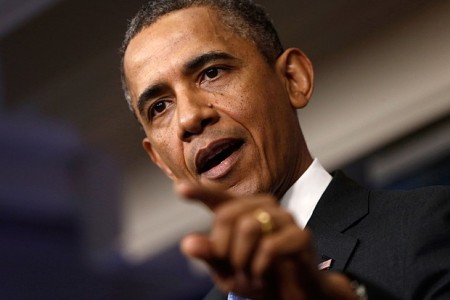LATEST: Qatari Aid Arrives in Kurdistan for Displaced Iraqis
FRIDAY FEATURES
UPDATE 1330 GMT: Iraq’s senior Shia cleric, Ayatollah Ali Sistani, has added to the pressure on the al-Maliki Government with the declaration that time is short to confront insurgents.
Sistani called for the “formation of an effective government that is acceptable on a…national level (and) avoids past mistakes”.
The Ayatollah said that, if the insurgency is not “fought and expelled from Iraq, everyone will regret it tomorrow, when regret has no meaning”.
Sistani’s representative at Friday Prayers called on men to defend Iraq by joining security forces, but asked them not to join militias.
A call by another Sistani representative last week was widely misreported by media as calling on Shia to take up arms, fuelling warning of sectarian warfare, without any reference to the cleric’s injunction that this be done through “legal structures”.
Abdul Mehdi al-Karbalai said in today’s sermon that “Iraqis of all religions and communities had to band together” in the fight against the insurgency.
UPDATE 1000 GMT: The Iraqi Government has responded to President Obama’s message with a show of force north of Baghdad.
On the frontline near Samarra, 70 miles north of Baghdad, which has become a frontline of the battle with the Islamic State of Iraq and the Levant, a provincial governor told cheering troops they would push insurgents back and recapture cities lost last week.
Governor Abdullah al-Jibouri, whose capital Tikrit was captured by insurgents in their rapid advance, said, “Today we are coming in the direction of Tikrit, Sharqat and Nineveh. These troops will not stop.”
He said the government had amassed more than 50,000 men near Samarra, home to two Shia shrines.
A “source close to Prime Minister Nuri al-Maliki” reinforced the message that the Government planned to strike back, as the US indicated that it would support — and even arrange — al-Maliki’s departure.
After days of build-up through statements and leaks to the press, President Obama confirmed on Thursday that the US wants Iraq’s Prime Minister Nuri al-Maliki to step down, as part of the plan to check the advance of the insurgency.
Obama did not explicitly call for Maliki’s resignation, but the implication was clear: “The formation of a new government will be an opportunity to begin a genuine dialogue and forge a government that represents the legitimate interests of all Iraqis.”
As part of the package for US military assistance, Obama called for “national unity meetings”:
Iraqi leaders must rise above their differences and come together around a political plan for Iraq’s future. Shia, Sunni, Kurds, all Iraqis must have confidence that they can advance their interests and aspirations through the political process rather than through violence.
The Ammericans, who helped keep al-Maliki in power in 2010 even when another party took more votes in elections, now believe that the Prime Minister is too wedded to his authority to end policies and actions that have alienated Iraqi factions, especially in Shia and Kurdish communities.
The US manoeuvres had been laid out earlier on Thursday with the planned revelation in The New York Times that the American Ambassador Robert S. Beecroft and senior State Department official Brett McGurk have been meeting leading Iraqi politicians.
See Iraq Feature: US Meets Senior Politicians for PM al-Maliki’s Departure
Although McGurk denied that the US was seeking al-Maliki’s departure, representatives of the politicians explained, ““We will not allow a third term for the prime minister; they must change him if they want things to calm down.”
Mohammed al-Khaldi, a top advisor to Sunni Speaker of Parliament, Osama al-Nujaifi, confirmed, “We have asked the Americans, Britain, Turkey, Saudi Arabia and Iran to work toward denying al-Maliki a new term. The Shiite bloc must find a replacement for him.”
A spokesman for former Deputy Prime Minister Ahmed Chalabi, a leading Shia politician and the choice of the US to lead Iraq in 2003, said Chalabi told the State Department’s McGurk that “it would be very difficult for Maliki to continue as prime minister”.
Qatari Aid Arrives in Kurdistan for Displaced Iraqis
#Iraq photo: 50 tons of humanitarian aid items arrive from #Qatar to #Erbil, #Kurdistan Region to help recent IDPs pic.twitter.com/zk1u67FP5t
— Radio Free Iraq (@iraqhurr_eng) June 20, 2014
Shia Volunteer: “If They Order Us To Blow Ourselves Up, We Are Ready to Do It”
Scott Peterson of the Christian Science Monitor offers a snapshot of Shia volunteers in Baghdad:
The Shiite recruit with a camouflage cap, black shirt, and dark stubble sits intently, holding a 9mm Glock pistol in his lap. Then, with a lightning move of his hand, he catches a wasp in mid-flight.
Without showing a trace of pain, he lets the wasp sting his palm before throwing it away – a fitting sign, perhaps, of the gritty determination he and his fellow Shiite recruits say they share as they enlist to push back the Sunni jihadists now rampaging across north and central Iraq.
Saad Hassan Abed may be just 28 years old, but he is an experienced fighter, having cut his teeth battling American troops in Sadr City, a poor Shiite enclave of Baghdad. Today, he’s heeding the call to arms by Grand Ayatollah Ali Sistani, Iraq’s most revered Shiite cleric, to defend the nation and its holy shrines.
“We know we are going to the front, to a war zone, but God created us to live on this ground,” says Mr. Abed, as his group of self-declared “RPG [rocket-propelled grenade] experts” nod in agreement. They’re waiting to enter a training base in north Baghdad where they will be joining the Iraqi Army. “If they order us to wear explosive vests and blow ourselves up, we are ready to do it,” he adds.

